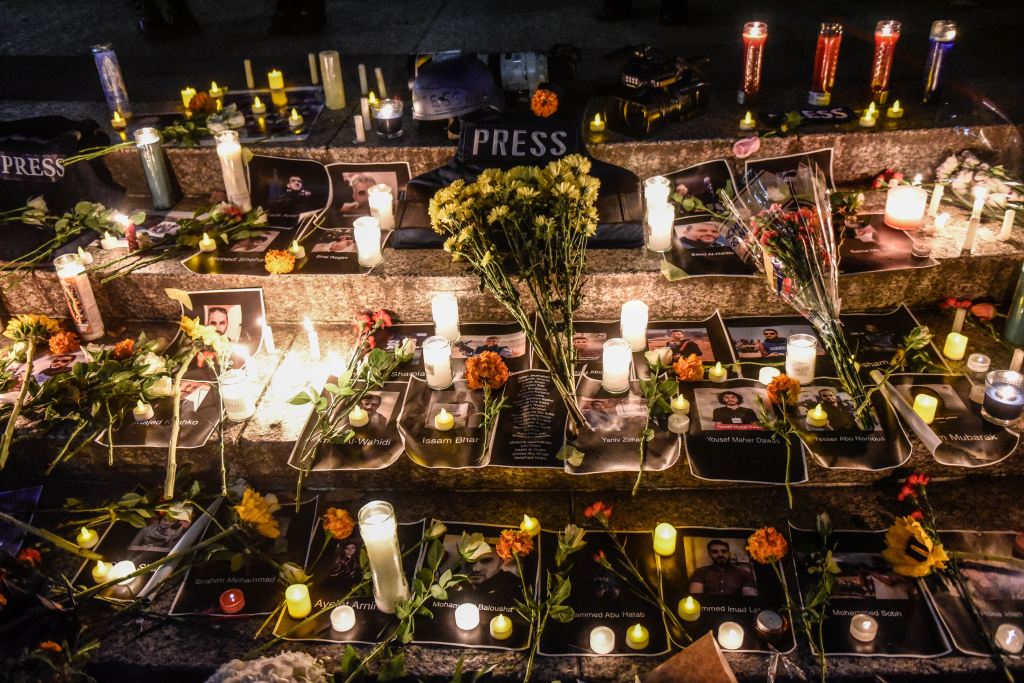One month after the start of the Israel-Gaza war, CPJ’s research showed at least 39 journalists and media workers have been killed, in what is now the deadliest month for journalists since CPJ began gathering data in 1992. As the conflict continues, journalists are facing increased hostilities, including 13 arrests, as well as numerous assaults, threats that obstruct reporting, cyberattacks, and censorship.
This week, CPJ joined in solidarity with journalists and press freedom advocates who gathered to mourn their colleagues killed during the ongoing war. The heartfelt gathering was organized by photojournalist David Delgado and colleagues whose moving tribute to the lives of those who bear witness at immense cost, was echoed with candles and flowers from attendees.
As journalists try to stay safe and continue working, they are also dealing with severe personal loss. Several journalists have also lost family members while covering the war. On October 25, Wael Al Dahdouh, Al-Jazeera’s bureau chief for Gaza, lost his wife, son, daughter, and grandson when an Israel airstrike hit the Nuseirat refugee camp in the center of Gaza.
➡️ Gaza through the eyes of a photographer killed in an airstrike and through the Instagram accounts of Palestinians documenting life under airstrikes.
➡️ Read our FAQ on how CPJ documents journalist deaths in the war
➡️ Subscribe to our Middle East and North Africa team newsletter for updates on the Israel-Gaza war and press freedom news from the region.
➡️ Learn from The Washington Post about how internet blackouts keep hitting Gaza over a week after a total communications blackout hit Gaza.
➡️ Read this opinion piece in MSNBC by Ayman Mohyeldin on Why we need journalists like my friend Wael in Gaza now more than ever.
➡️ The New Yorker describes how prominent left-wing Israeli and Palestinian journalists and peace activists are increasingly being targeted with harassment and doxxed.
➡️ Reuters and The New York Times’ statements denying the allegations that their journalists had advance knowledge of the October 7 Hamas attack.
- Romanian authorities close investigation into harassment and smear campaign against journalist Emilia Șercan
- Belarusian journalist Alyaksandr Mantsevich sentenced to four years in prison
- In Turkey, three journalists detained for “disinformation,” one jailed, three others under investigation
- CPJ alarmed by ongoing detention of Stanis Bujakera
- Malian journalist Abdoul Niang charged with making false statements
- Two journalists assaulted by protestors in South Africa
- Local politician attacks journalist in Brazil
- Iranian journalist Negar Ostad Agha detained reporting on girl’s funeral
- Myanmar junta raids Rakhine State news agency, arrests journalist
On November 5, Filipino radio journalist Juan Jumalon was shot dead while live broadcasting on Facebook. The attacker stole Jumalon’s gold necklace before escaping on a motorcycle driven by a waiting accomplice.
“The wanton killing of radio reporter Juan Jumalon shows that President Ferdinand Marcos Jr.’s government isn’t doing enough to protect the press,” said Shawn Crispin, CPJ’s senior Southeast Asia representative. “Talk is not equivalent to action. Until [President Ferdinand] Marcos Jr.’s government shows it is serious about ending impunity for such killings, journalists will continue to be murdered at a horrific rate in the Philippines.”
With the death of Juan Jumalon, a total of four journalists have been killed in the Philippines since Marcos Jr. came to power in June 2022.
The Philippines, a country with a troubling record of journalist murders, ranked eighth on CPJ’s 2023 Impunity Index, which spotlights countries worldwide where journalists are slain and their killers go free.
What we are reading
- The role of law enforcement agents: ensuring safety of journalists during public demonstrations and elections — UNESCO
- We must do more to address the online harassment of women journalists — Freedom House
- Reporting from Gaziantep — Stefania D’Ignoti, Nieman Reports
- No justice for journalists killed and brutalised by police officers — Robert Wanjala, The Standard
- Fighting for my brother, Egypt’s most famous political prisoner, part 1 and part 2 — Ramita Navai and Maryam Maruf, BBC Sounds
- Is the free media in Central Europe under threat? — Robert Schuster, Transitions
A closer look
CPJ U.S. and Canada Program Coordinator Katherine Jacobsen traveled to Atmore, Alabama, this week to find out more about the arrests of Atmore News publisher Sherry Digmon and reporter Don Fletcher. A gag order prevents Digmon and Fletcher from publicly speaking about the case, but Jacobsen met with their lawyer.
Jacobsen also spoke with The Washington Post about the case and the difficulties faced by local journalists working in the United States.
